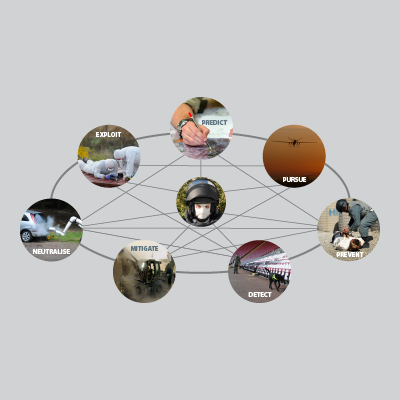Genome engineering is undergoing unprecedented development and is now becoming widely available. The ability to identify the designer of engineered biological sequences – termed genetic engineering attribution (GEA) – would help ensure due credit for biotechnological innovation, while holding designers accountable to the communities they affect. Such methods have the potential to aid in the identification of lab of origin for outbreaks caused by genetically engineered organisms, which could protect against potential misuse of newly developing technology. Here, Dr Oliver Crook will present a method based on deep metric learning to rank the most likely labs of origin of engineered DNA sequences. He will also present the results of a recent data science competition: the Genetic Engineering Attribution Challenge. The results show that dramatic improvement is possible and the importance of using a variety of metrics for evaluating model performance.
The Terrorism Risk Assessment, Modelling and Mitigation Seminar Series (TRAMMSS) is a virtual seminar series focused on technical topics related to terrorism risk assessment and modelling, including blast modelling and response; IEDs; vehicles as weapons; CBRN; big data for risk assessment, security and screening; and associated mitigation measures.
Speakers
Dr Oliver Crook is a Florence Nightingale Fellow in Statistics at the University of Oxford, after finishing a PhD in Biochemistry at the University of Cambridge in 2020. His work focuses on using machine learning and statistical methods to analyse biological data. He is particularly interested in data analysis of mass-spectrometry and data that arises in the early phases of the pharmaceutical pipeline. More recently, he has started thinking about the role of statistics in synthetic biology and this has led to some contributions to genetic engineering attribution. This work has directly fed into the biosecurity policy on the international stage.
Who should attend
This seminar is open to guests from outside Cranfield, who may work in academia, research or industry. Due to the potentially sensitive nature of this seminar series, guests should be able to show that they are affiliated with an appropriate bona fide organisation.
Cost
The event is free of charge, but participants must register for the TRAMMSS mailing list in advance.How to register
To attend this seminar, you must register for the TRAMMSS mailing list via the online form. Further information on the TRAMMSS community can be found on our website.


